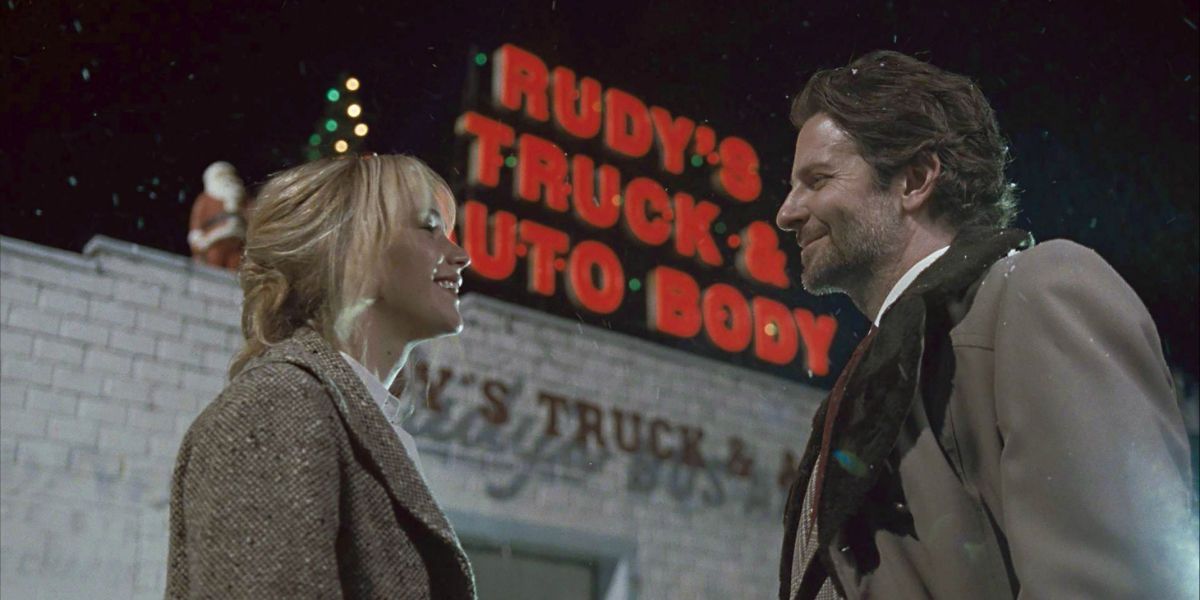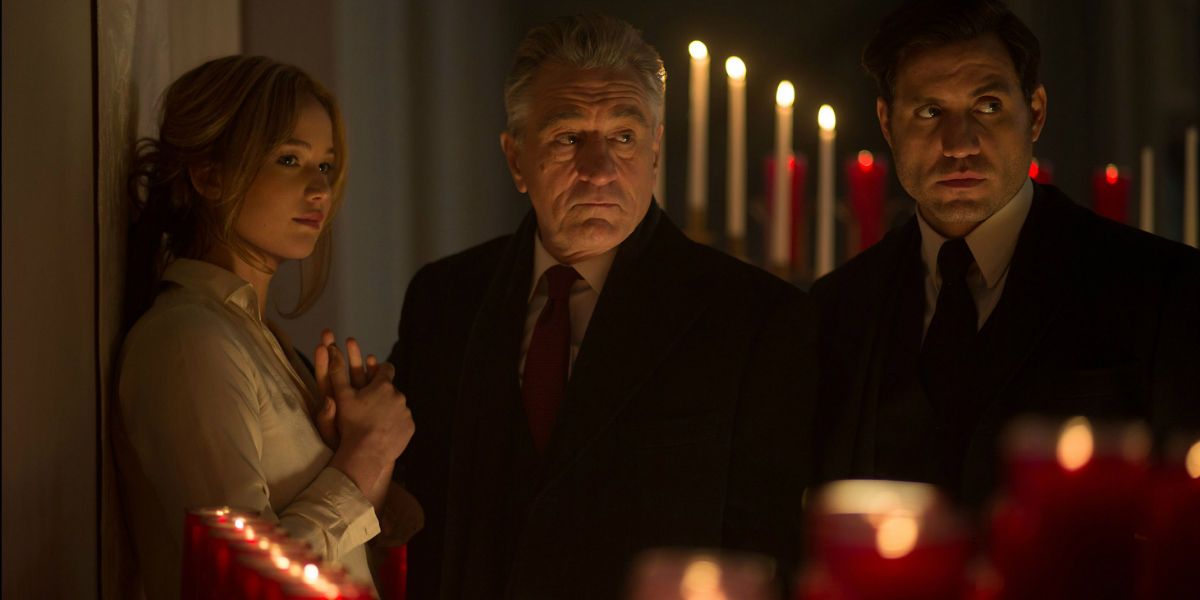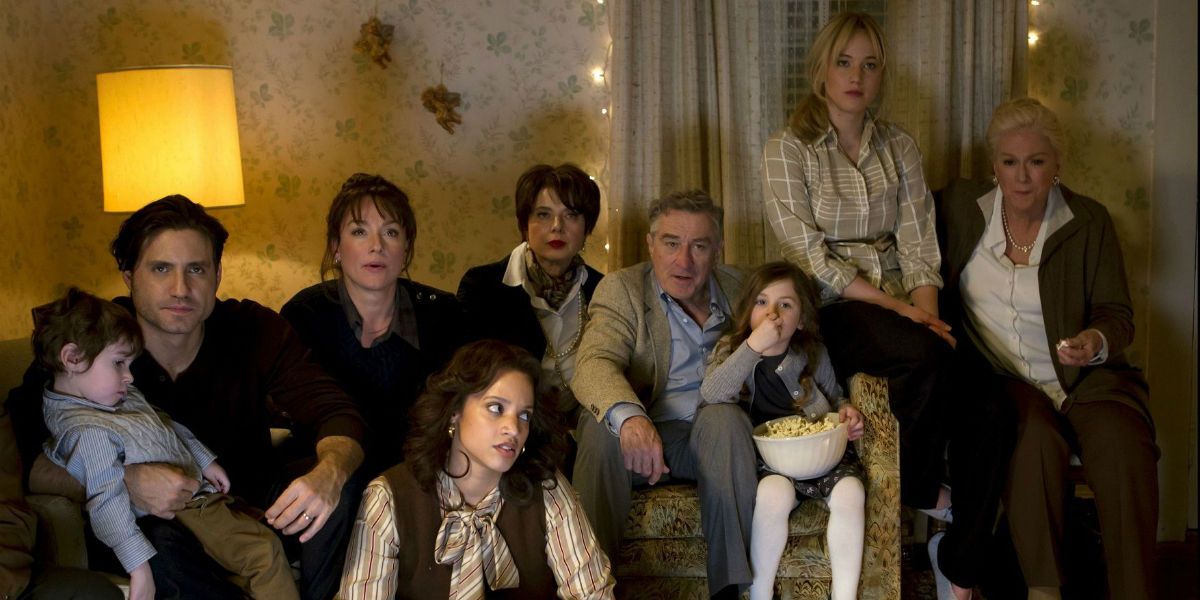Joy is a decent biographical drama anchored by Jennifer Lawrence's performance, but fails to realize its greater ambitions.
Joy introduces us to its namesake - who, as a young girl, loves to design and invent new (and better) versions of common household items. Jump ahead to the early 1990s and Joy (Jennifer Lawrence) has grown up to become a divorced mother with children, having put her dreams on indefinite hold in order to care for her dysfunctional family - including, her mom Terry (Virginia Madsen), a shut-in who spends her days watching soap operas; her dad Rudy (Robert De Niro), an emotionally volatile man who runs a local auto shop; and her ex-husband Tony (Édgar Ramirez), a small-time singer who now resides in the basement of Joy's house.
One day a minor turn of events unexpectedly inspires Joy to design and construct a more effective type of mop, in the hope that she can mass produce her invention - which leads her to Neil Walker (Bradley Cooper), an executive who works for the televised shopping network QVC, where Joy can advertise her creation. However, the closer Joy gets to achieving her dreams, the more obstacles present themselves and threaten to break her spirit - for good this time.
Written and directed by David O. Russell, Joy reunites the filmmaker with a number of his Silver Linings Playbook and American Hustle collaborators - most notably, of course, Jennifer Lawrence - for a movie that is loosely based on the life of entrepreneur Joy Mangano. Joy is perhaps Russell's most straight-forward dramatic film to date, though it still has dark comedic elements (see: its examination of blue collar Americans and their dysfunctional habits) and idiosyncratic touches that film buffs associate with his work. Russell is also known for elevating his films above the conventions of their respective genres, but he proves less successful in that regard with Joy.
Joy incorporates a number of intriguing ideas and concepts into the mix - juxtaposing its proceedings with those of the soap operas that Joy's mother watches (as a framing device), while at the same time drawing parallels between the matriarchal structure of Joy's family and that of a crime family, with Joy herself as "The Godmother" figure. The film also touches upon a number of intriguing notions (like how the United States is a melting pot of culture and race), yet these elements are not linked together in a manner that forms a cohesive through line. Joy boasts a predictable, but solid, story about the realities of the American Dream told from the perspective of a woman at its core, but the additional material in the movie - which Russell presumably added when he revised the initial script draft from Annie Mumolo (Bridesmaids) - doesn't enhance that storyline in a substantial way.
Russell and cinematographer Linus Sandgren (American Hustle) creating a number of striking images while staging the proceedings in Joy - at the same time maintaining the natural and unvarnished visual style that Russell has become known for (as a director). Problem is, Joy doesn't have a consistent logic when it comes to how it's constructed visually, and the movie's editing style likewise doesn't maintain a consistent rhythm - giving rise to pacing issues, when it comes to how the larger narrative unfolds. Joy also has issues when it comes to creating a sense of time and place; the costume designs from Michael Wilkinson (another American Hustle alum) are solid, but the vintage tunes and pop songs that make up the soundtrack don't capture the spirit of the film's setting the way they have in Russell films past. Like with his script, Russell makes some mismatched choices with his direction.
Joy's story here (the deviations it takes from the real Joy Mangano's life included) is a compelling one that holds the ship together, coupled with another strong lead performance by Jennifer Lawrence. As it were, Lawrence's performance here is also refreshingly different from her work in past Russell films, as she portrays Joy as being a dignified and worn-down, yet at the same time driven and hopeful soul who strives to maintain her composure (as best as anyone can) even given the generally complicated and frustrating nature of her life. Robert De Niro likewise does solid work as a different sort of messy father than the one he played in Silver Linings Playbook, while Bradley Cooper also shows a different side of himself as an actor - playing the role of a well-composed and experienced man of business (though his roles in previous Russell films were meatier by comparison).
The supporting crew in Joy serves their roles in the film's narrative well, but most of them end up being flat in terms of development. Virginia Madsen (Sideways) and Édgar Ramirez (Point Break (2015)), as Joy's mother and ex-husband are only partly fleshed out, as are Elisabeth Röhm (Stalker) as Joy's half-sister Peggy and Isabella Rossellini (Enemy) as Joy and Peggy's dad's wealthy girlfriend. Moreover, all of these characters become a secondary concern as the over-arching plot starts moving along faster, as do folk like Dascha Polanco (Orange is the New Black) and Diane Ladd (Enlightened) in such important roles as Joy's supportive friend and grandmother, respectively - despite the good performances from all concerned parties. The movie plays with the idea that Joy's life and the people in it are like those in the soap opera that Joy's mom watches, but that idea isn't developed quite well enough to make up for the film's half-baked characters, as was seemingly intended.
The short of it? Joy is a decent biographical drama anchored by Jennifer Lawrence's performance, but fails to realize its greater ambitions. The ingredients needed for a film that offers profound commentary about the nature of the American Dream are present, but either are not plentiful enough and/or aren't combined in the most effective way - suggesting the project needed another rewrite or pre-production development to achieve greatness. Nonetheless, Jennifer Lawrence's compelling performance and the interesting look at Joy Mangano's rise to fame (factual and fictionalized parts alike) are reason enough for those who're intrigued by Joy to give the film a look at some point.
TRAILER
Joy is now playing in U.S. theaters nationwide. It is 124 minutes long and is Rated PG-13 for brief strong language.
Let us know what you thought of the film in the comment section.




